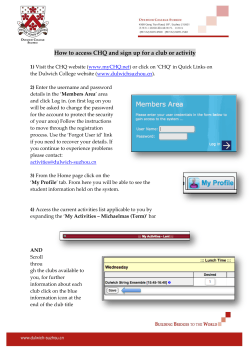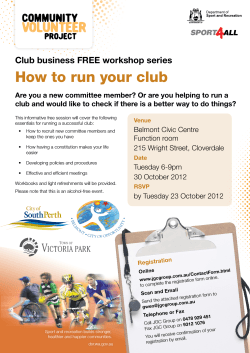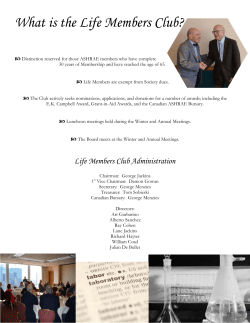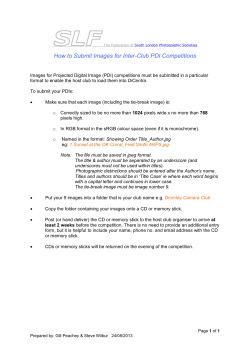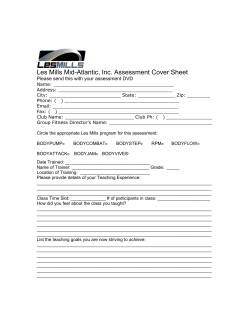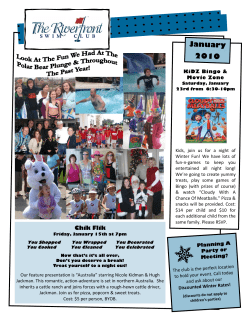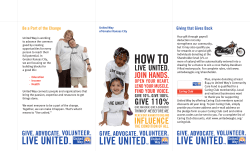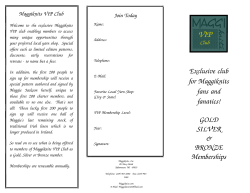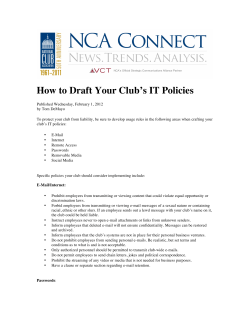
advisor manual
advisor manual TABLE OF CONTENTS 3. 4. 5. 6. 7. 9. 10. 11. 12. 14. 15. 18. 20. 21. 22. 23. Contact Information Club and Organizations Advisor Roles Club and Organization Registration Student Officer Roles within Clubs Membership and Recruitment Budgeting Funding Request Funding/Donations Planning Your Event Publicizing Your Event Student Club Logo Usage Liability and Risk Reduction Purchasing Travel Drugs and Alcohol Policy 2 • 2014 - 2015 Advisor Manual Mitch Karstens Director of Student Life 970.248.1272 mkarstens@coloradomesa.edu Breanne Meier Assistant Director of Student Life 970.248.1250 bmeier@coloradomesa.edu Colorado Mesa University Contact Information Mitch Karstens Director of Student Life 970.248.1272 mkarstens@coloradomesa.edu Breanne Meier Assistant Director of Student Life 970.248.1250 bmeier@coloradomesa.edu Office Hours: Tuesday, Thursday & Friday Scheduling Contact these individuals to reserve spaces: Claudia Keller 970.248.1414 ckeller@coloradomesa.edu University Center, Elm Avenue Quad, Ellipse, Library, Academic Quad, Sodexo Food Services, and Facility Needs Kawna Safford 970.248.1406 safford@coloradomesa.edu Library Lynn Wilson 970.248.1058 lywilson@coloradomesa.edu MavPav, Hamilton Recreation Center and Delta Field Lyn Ross 970.248.1233 lross@coloradomesa.edu Moss Performing Arts Paula Nichols 970.248.1843 nichols@coloradomesa.edu Academic Building Spaces 3 • 2014 - 2015 Advisor Manual Student Life Organization Numbers: Associated Student Government 970.248.1707 Campus Design Studio / Stall Street 970.248.1197 Club Advisory Board 970.248.1111 Cultural Diversity Executive Board 970.248.1664 Horizon Magazine 970.248.1538 Intramural & Club Sports 970.248.1591 KMSA 91.3 970.248.1442 MAVrides 970.248.2222 Outdoor Program 970.248.1428 Programming Activities Council 970.248.1750 Residence Life 970.248.1536 Student Life Front Desk 970.248.1111 The Criterion 970.248.1255 Athletics 970.248.1503 Sexual Assualt Response Team 970.270.5895 Stop Abuse in Relationships 970.248.1765 Colorado Mesa University CLUB AND ORGANIZATIONS Definition of Club vs Organization CMU Student Club: A group, inclusive of current CMU students who voluntairly meet on a regular basis for a mutual purpose. • Governed by the club advisory Board • Funded through funraisers or by requesting club funds though the Club Advisory Board, not student fee funded. • Leadership positions are not paid and are not elected through process that is outlined in club and or CAB constitution. • Must be advised by a club chosen CMU faculty or Staff member, the department of Student Life, and parent organizations which include, but is not limited to the Club advisory Board. • Active Status is granted yearly, pending the registration or renewal of the club through the online OrgSync platform and the completion of Student Life Officer and Advisor training. CMU Student Organization: An organized body of currently registred CMU students that have a collective goal and serve a particular purpose defined in their organizations' constitution. • Governed by Association of Student Gonvernment and the Student Life Department. • Funded through CMU student fees. Funded budgets are determined through the Bi-Annual Fee allocation Process. Fundraisers are allowed and collaboration with other organizations, clubs, or departments are encuraged. Organizations are not allowed to receive funding through the Club Advisory Board. • Leadership positions are paid and are elected or selected through process that is outlined in that organizations' constitution. • Must be advised by a CMU faculty or Staff member, who is approved through the Student Life department as well as its parent organization, the Association of Student Government. • Active Status is ongoing, based upon the allocated budgetary funds through the Bi-Annual Fee Allocation Process as well as the renewal of the organization through the online OrgSync platform and the completion of Student Life Officer and Advisor training. 4 • 2014 - 2015 Advisor Manual Colorado Mesa University ADVISOR ROLES Each advisor role is distinct in and of itself and holds a multitude of responsibilities. Some Advisors choose to play very active roles by attending meetings, working with student officers, and assisting in program planning and development. Others maintain a more distant relationship to the organization. It is realized that each Advisor will perceive his/her relationship to their student organization or club differently, but hopefully regardless of the relationship, maintain some regular contact with his/her organization. An Advisor should be accountable for being well informed about organization or club activities and be responsible for advising its officers on the appropriateness and general merits of policies and activities. However, Advisors are not responsible for the actions or policies of student organizations or clubs; students are solely responsible. Advisors should be both accessible and interested and should provide whatever counsel a group or its members might seek. Questions to ask the Club or Organization • • • • • • • • How much involvement is expected or needed? How often does the group meet? How many major activities does the group plan per semester? How experienced are the student leaders? What are some of the problem areas your organization needs advisory assistance with? In what ways could the Advisor can be more helpful to the group? Will the Advisor be a silent observer at meetings or an active participant? Should you interrupt during meetings if you think the group is getting off track? How? When? 5 • 2014 - 2015 Advisor Manual Colorado Mesa University CLUB AND ORGANIZATION REGISTRATION How to start a club Colorado Mesa University has over 90 different clubs for students to choose from. However, students are always able to start new clubs if something they are interested is not available. Starting a club is an easy process and each new club is automatically given $50 from CAB to help get everything up and running. In order to start a club, there are 6 requirements: • 3 interested students to be club officers • President • CMU Faculty/Staff Advisor • Vice President • Club constitution • CAB Officer In order to become an official, recognized club on campus the club leaders along with the advisor need to register their club through OrgSync. If a club has registered in a previous year, then they will be prompted to “renew” their club on OrgSync on a regular basis. Registration Forms: Can be found on Orgsync. To register a new club: • Go to orgsync.com, click on “Login” on the top right corner, select “Colorado Mesa University” from the list of communities, then login with your MavZone login information. • Click “Organizations” on the top bar, then click “Register New Organization” on the right side of the page. • Select “Student Life” and hit Select. Next, completely fill out the form. A sample constitution is available on OrgSync by clicking “Student Life”, then clicking “Files” on the left side menu bar. Things to consider including in your constitution are how selection of officers takes place, what happens with vacant positions, impeachment guidelines, purpose of club, and any membership requirements, etc. Please note that all clubs must remain open to all students of CMU and there cannot be any membership fees involved with the local club. If your club is associated with a national organization it is acceptable to have the option to pay fees to be a part of the national organization; however this must never become a requirement to be a part of the local club. 6 • 2014 - 2015 Advisor Manual Colorado Mesa University STUDENT OFFICER ROLES WITHIN CLUBS Each club should address the basic roles and responsibilities that come with holding a club officer position in its own club constitution and bylaws. Below are some examples of roles and corresponding responsibilities. These examples are intended to assist you in constitutional development and to help you answer the question, “Now I’ve been elected, what am I suppose to do?” Individual interest areas and skills often dictate the amount of time an officer spends on a particular responsibility. However, a good officer never forgets what the basic responsibilities are. Role of the President Some Potential Responsibilities • Presides over all meetings of the club • Calls any special meetings for the club • Reserves appropriate facilities for club events and activities • Completes Event Registration form on OrgSync • Appoints committee chair people • Maintains routine contact with club advisor • Remains fair and impartial during club decision making processes • Votes in cases where there is a tie • Coordinates club elections Role of the Vice President Some Potential Responsibilities • • • • • • Assume the duties of the President as needed Serve as an ex-officio member of standing committees Coordinates club recruitment efforts Represents the club at any official school functions Remains fair and impartial during club decision making processes Coordinates club elections 7 • 2014 - 2015 Advisor Manual Colorado Mesa University Role of the Secretary Some Potential Responsibilities • • • • Monitors record of all membership contacts on OrgSync Monitors record of all activities and events on OrgSync Keeps and distributes agendas for meetings Creates and distributes agendas for meetings (sample available on OrgSync in the “Files” folder) • Notifies all members of meetings (via OrgSync with text messages, emails, or posting) • Regularly updates club OrgSync calendar with events • Obtains appropriate facilities for organization activities • Completes and submits any required CAB forms on OrgSync • Handles all official correspondence of the club • Represents the club at any official school functions • Remains fair and impartial during organization decision making process • Coordinates club elections Role of the Treasurer Some Potential Responsibilities • • • • • • • • Keeps all financial records of the club/organization Pays all club bills, with the assistance of the club advisor Prepares and submits financial reports to the members Completes and submits all Funding Requests forms for CAB through OrgSync Is familiar with CMU accounting procedures and policies Coordinates any club fund raising efforts according to CMU policy Represents the club at any official school functions Remains fair and impartial during organization decision making processes Role of the Club Advisory Board (CAB) Representative Some Potential Responsibilities • Attends and represents the club at all CAB General Assembly meetings • Attends, represents, deliberates, and votes on behalf of the club at all CAB Allocation Meetings • Completes and submits any forms through OrgSync that are required by CAB for membership, activities, events, funding, and travel 8 • 2014 - 2015 Advisor Manual Colorado Mesa University MEMBERSHIP AND RECRUITMENT New members bring new ideas, energy, and often become the future leaders of the club. Students join clubs for many reasons such as connectivity to our campus, meeting new friends, and developing better skills sets in preferred areas. Recruitment and retention is the responsibility of every member of your organization! Know and Understand Your Club • It is important that both the leadership and the membership know what the club goals and objectives are. • Have an organizational meeting to discuss goals and objectives. Revisit these set goals yearly to make sure they are still appropriate and accurate for your current clubs state. Update as necessary, however be cautious in changing goals. • Consistency is also important for a sustainable club. • Remember the initial purpose/mission of the club and develop the clubs direction with that in mind. • Develop a membership profile. What type of student do you need to make this club successful? Who would complement your current membership? Set Recruitment Goals Now that you know the type of students you are interested in recruiting, the next step is to set some recruitment goals. Here are some questions to think about when forming your recruitment goals. • How are you going to get these targeted students interested in joining your club? • What places do these potential members hang out at? • What kind of publicity would attract their attention? Not sure how to get your club out there? Each fall & spring semester, Student Life hosts the Club and Organization Fair to help promote our clubs on campus. Hosting a table at the club fair is a great way to get the information about your club out there and to gain new members. The Club Fair usually takes place in the second or third week of school. Remember what made you get involved with this club. Think back to when you first became involved. What attracted you? How were you recruited? If you weren’t, how did you hear about the group? Why have you stayed involved? 9 • 2014 - 2015 Advisor Manual Colorado Mesa University Plan Your First Meeting of the Year Many groups find it beneficial to have a meeting or ceremony to welcome new members. Have your current leaders identifying current members who might want to get assist with this meeting preparation. Personally invite current and potential members to attend this meeting. Talk about your club. Inform students briefly on the purpose of the club and what some of the clubs goals are for the year. Sell the club and the benefits that your club membership has to offer them. If this meeting is more informal in style, personalize the message to each potential member to increase your chances of connecting with these potential members. CAB Membership Checks The Club Advisory Board will regularly check the membership records of each club throughout the year to determine how many members are in each club. These membership checks will provide CAB with information on which clubs are successfully gaining and retaining memberships and display which clubs could use help from CAB in this area. Club officers also can also export and print their current membership list through OrgSync for their personal records. BUDGETING One task clubs face is the development of a plan to be fiscally responsible with funds. A budget can be a helpful method for keeping track of these funds. Assessing your budget early and often may help to refine club goals to reflect a more realistic resource environment. Accurate accessing does allow for better, more efficient decision making. Developing a Budget • Off campus bank accounts are prohibited. • To determine available funds, contact the Assistant Director of Student Life, Breanne Meier (bmeier@coloradomesa.edu) or visit Accounts Payable for a printout of your group’s budget. • Prepare an outline of the clubs tentative activities and cost for the coming year. • Do careful research when determining possible sources of funding, cost of activities and available resources. Assist in getting price quotations for tentative activities and programs, especially bigger expenditures. • Estimate expected income and when it is expected to be available (allocations, fundraiser sales, etc.) • Rank tentative activities in order of importance according to the club and campus' interests. • Determine which activities/programs are realistic to carry out by using your estimated yearly budget. • Eliminate the less essential expenditures. • Revise, review, coordinate, cross-reference, and then assemble into a final projected budget; the budget must be flexible to anticipate conditions which might have been overlooked during planning. 10 • 2014 - 2015 Advisor Manual Colorado Mesa University Managing the Budget • Budget should be monitored closely and often. • Set and maintain a minimum cash balance. • Formulate procedures and policies needed to achieve objectives. • Keep an accurate log of financial transactions (income/expenses); • Set up internal controls designed for safeguards and accurate accounting data. Be careful in giving out signing authority to officers who may not need it. • Control expenditures: allow only approved expenditures to be process. *Please note that only official club officers, the official club advisor, and Student Life Professional Staff may be granted signing authority on any club or organization budget. Administrative assistants, fellow colleagues, club members, and/or student work aids may not be granted signing authority. FUNDING REQUEST Through student fees, CAB obtains funding that is allocated between all represented clubs in quarterly meetings during the academic school year. Please refer to the CAB website for these CAB Allocation Meeting dates. Funding Requests Forms must be submitted on OrgSync by the assigned dates posted on CAB website. Any exceptions must be cleared by CAB. Funding request forms are available to the general assembly at all times throughout the academic school year. Funding requests must be filled out completely before being submitted to CAB to be eligible for consideration by the general assembly. No club may request more than 20% of the money available to be allocated at a quarterly meeting. Any club that is not open to any Colorado Mesa University student wishing to participate is not eligible to receive funding from CAB. All clubs who wish to receive funding must have a representative present at the allocation meeting to answer questions regarding the funding request. Any club not present will have their request removed from the docket. Club Funding Requests will be considered individually based on registration requirements, need, merit, past spending, and fund-raising via General Assembly deliberations. Clubs are required to attend the previous general assembly meeting to be eligible for funding through CAB. In the event there are available funds after allocating to the clubs that were in attendance at the previous general assembly meeting, all other requests will be considered by the assembly to be allocated. Each club is required to plan and conduct two fund-raising events per semester to be eligible to request CAB funding. Fund-raising proposal forms are due to CAB prior to the first funding allocation meeting of the semester. 11 • 2014 - 2015 Advisor Manual Colorado Mesa University 1. Clubs can ask for funds from Club Advisory Board (CAB), Regional National Competition Fund (RNCF), Student Control Reserve Fund (SCRF), Mesa Environmental Fund, or any other student fee fund for an event or activity, however clubs may only accept funding for the event or activity from one budgeting body. 2. Clubs receiving regular funding from another budgeting body (i.e. Hamilton Recreation Center, Athletics, Cultural Diversity Board, Media Board, etc) are not eligible for CAB funds. 3. Inactive clubs • If a student club is inactive for two (2) academic years, any funds being held will be reabsorbed into the CAB budget for reallocation. FUNDRAISING / DONATIONS Many student clubs have big plans and excellent ideas for programs or services. However, few clubs and organizations have the finances to turn these plans in to reality. It is important for student groups to have some type of fundraising plans and to execute those fundraisers. If clubs are intending to ask CAB for funds during the year, it is important to note that CAB requires each recognized club to do two fundraisers per semester, and each registered club to do one fundraiser per semester. Fund-raising proposals are due to CAB through OrgSync prior to the first funding allocation meeting of the semester. It is important to make any fund-raising project a group effort and to get as many people involved as possible. Not only will you have more help to accomplish your goals, but you will also get more people interested in giving money. Make sure that the reason you are raising money is a legitimate cause, and let everyone know why you are raising funds. Planning Your Fund Raiser • Set a monetary goal and know what your overhead cost will be. • Brainstorm for ideas with your members and see what the members are interested in doing • Remember to follow CMU policies and procedures; ie. No use of any beverage products unless it’s a Pepsi product because CMU has an exclusive contract with Pepsi. • Find out what has been done before. What worked? What didn’t? Why? How can you improve? • Check into local and state regulations as well as CMU policies. Complete Fundraiser Proposal Form and turn into the Club Advisory Board on OrgSync at least two weeks before your fundraiser is set to take place. • Involve all segments of your group, not just the officers. People contribute to what they create. Make sure they understand the cause and are willing to contribute their time and effort. • Advertise wisely. • Thank supporters. Give your big donors some kind of tangible reminder of how they contributed to a good cause. Create and maintain good will with these contributors, because they will tend to help in the future. 12 • 2014 - 2015 Advisor Manual Colorado Mesa University • Complete a written evaluation of the fundraiser for your club. Include things such as contact names, addresses, and phone numbers, time lines and important dates, and suggestions of things to do differently in the future. Fundraising Proposal Form Complete the fundraising proposal form with your club or organization advisor and submit it to the Club Advisory Board through OrgSync. You must submit this proposal at least two weeks prior to your fundraiser. Fundraiser may not be carried out until approval is received from CAB. The Fundraising proposal can be found on your club or organization page in the event tab on the left menu bar, then clicking "Create An Event". Corporate Sponsorship or Donations One of the best ways to increase fund raising efforts is to obtain corporate sponsorship for an event, either through underwriting or direct contributions from companies. Corporations will help to fund an event if it is in their marketing plan. Are their customers likely to come to this event? Will sponsorship in an event help them attract new customers and get their name seen? If your club/org wants to approach businesses for corporate sponsorships or donations, please submit a list of all businesses they want to contact, per fundraiser or event, to Breanne Meier at bmeier@coloradomesa.edu. Clubs /organizations may not contact any business until business list is approved through Student Life. How to Ask for Corporate Funding Plan far in advance. Most corporations plan their donation budgets six to twelve months in advance. Talk to a company as early as possible. Do not expect to get donations in a month. Try to target a specific company who could definitely benefit from your cause rather than sending out blanket letters to everyone. Address your pitch letter to the person in charge. Do NOT just write “To Whom It May Concern” or “Dear Sir/Madam.” Call and obtain the person’s appropriate name and title. Put your proposal in writing. State your cause in terms of benefits to the company. What to Ask For • Product: Straight-product contributions for samples to give to participants or for door prizes. Most companies have their products in trial sizes just for this purpose. • Printing: Underwriting the cost of printing posters, flyers, or t-shirts. In return, you will put their name and logo on all printer material. • Ads for Programs: Sell ad space in a program that is given out at the event you are sponsoring. You may want to give companies who donate products or supplies and materials free ads. • At an Event: Hang ads with logos on banners or posters for a fee. This is an excellent source of income at sporting events or anywhere there is a place to hang a poster during an event. 13 • 2014 - 2015 Advisor Manual Colorado Mesa University PLANNING YOUR EVENT All clubs and organizations that are planning an event, on or off campus, are required to submit an Event Planning Form to the Club Advisory Board through OrgSync no less than 3 weeks before the tentative date. All events are tentative until CAB has approved your Event Planning Form. If the event has not received CAB’s approval to move forward, the club is not allowed to proceed with the scheduling and promoting of this event. It is highly suggested that the bigger the event, the earlier paperwork should be submitted on OrgSync to CAB. The Event Planning Form is located on OrgSync on the left hand bar on your clubs page under “Events”. For approved events that require scheduling locations, facilities needs, food services please contact the appropriate person below… Claudia Kellar: 970.248.1414 ckellar@coloradomesa.edu Scheduler of University Center space, Elm Quad, Sodexo Food Services, Facility Needs, Ellipse Lynn Wilson: 970.248.1058 lywilson@coloradomesa.edu Scheduler of Hamilton Recreation Center, Delta Field Paula Nichols: 970.248.1873 nichols@coloradomesa.edu Academic Building Spaces (Houston, Dominguez, Wubben, Escalante, library) Kawna Safford: 970.248.1406 safford@coloradomesa.edu Table & Chair Request The Facilities Department requires all on campus groups who want to reserve tables or chairs to fill out the Table & Chair Request Form. This form is located online at coloradomesa.edu/studentlife/orgforms.html. You can also submit your Table & Chair Request as a part of the Event Request Form on OrgSync. Sodexo Food Services Sodexo has the exclusive food and beverage contract in the University Center as well as any floor in any academic building where a Sodexo Food Outlet is located. Outlets include Concessions in the Maverick Center, Jazzman’s on the 1st floor of Dominguez, and Sandella’s on the 1st floor of Houston Hall. Schedule all Sodexo food orders through Claudia Kellar in the University Center. Alcohol at Your Event If a club/org is thinking about having alcohol at an event whether it is on or off campus they must get preapproval. The process must be started at LEAST one month before the event. If a club/org is considering this please set a time to meet with a Student Life professional staff at least five weeks before the event to start the process. Pepsi Beverage Company Pepsi has the exclusive Beverage contract throughout our entire campus, including WCCC and Montrose Campuses. Any beverages that are dispersed at any student club or organizations functions must be from the Pepsi line, including bottled water and energy drinks. CMU has the right to confiscate and discard any beverage product that is not a product of Pepsi. 14 • 2014 - 2015 Advisor Manual Colorado Mesa University PUBLICIZING YOUR EVENT The following tips may be helpful in publicizing your opportunity or event. Use some, or use them all—just make sure to get special permission when required. Be sure to follow the Marketing Department’s Manual when creating any type of promotional, marketing, or advertising materials for your club. This includes but is not limited to club shirts, promotional gadgets such as pens and writing pads, and the use of the CMU logo on any poster or flyer. OFF-CAMPUS Avenues of Advertising Create flyers for posting in the community. Grocery stores, churches, day-care centers, department, stores, bars, laundry mats, and other high-traffic establishments are good, depending on whom you are targeting. Acquire approval where needed. ON-CAMPUS Avenues of Advertising • Create Flyers for posting on campus bulletin boards. Refer to the On Campus Advertising Policy on the next page and get approval for your posters by uploading them into OrgSync with your Event Registration form in the Events folder on the left side menu. (Approval in Student Life Office desk) • Contact Dana Nunn, Director of Media Relations, for campus wide emails, MAVzone announcement posts, press releases, and to advertise on digital signage (Bulletin). • Contact the Campus Design Studio at cmu.cds@gmail.com to advertise with the Stall Street Journal. • Contact the Criterion & local newspapers for placement in their calendar of events. • Contact KMSA or local radio stations to ask if they’d donate a PSA (public service announcement) – KMSA is free for clubs and organizations. • Purchase professionally created posters. • Chalk sidewalks in approved locations around campus. (Contact Director of Student Life) • Create table tents for display in Bookcliff & Dining Hall. (Please get approval first from Student Life Desk 248.1111 or 2nd floor in the UC) • Have a display table in one of the academic buildings or outdoor quads with free giveaways. Schedule with Claudia Kellar @ 248-1414. • Go to a department head or faculty/ staff meeting, or directly contact faculty/ staff to make sure they know about your event. They may announce it in class! • Have a mini-event as a teaser. • Order food from Sodexo Food Services as an enticement for students to come to the event, or give away door prizes for those who stay throughout the event. Make sure to promote these opportunities! • Announce your event in your classes. • Create postcards and sent via US Mail. (For a cost) *Handbills are not allowed in lounge areas or on department desktops without prior approval from those departments. 15 • 2014 - 2015 Advisor Manual Colorado Mesa University Bulletin Board Posting Locations at CMU On Campus Groups On Campus Groups / University Community *The following maroon and white chart is for campus groups and the university community only* Approval Person Building Name Office Phone Number How many postings allowed Dominguez Hall 5 Fine Arts 2 Houston Hall 4 Tomlinson Library 1 Lowell Heiny Hall 2 Mitch Karstens Maverick Center ex 1272 1272 Student Life Life UC 212 Student 3 Moss Performing Arts Center 2 Outdoor Program 1 University Center 4 Wubben Hall and Science Center 4 Escalante Hall TBA Residence Halls Drop posters off at Res Life ex 1536 Residence Life 67 Total Posters Allowed 83 Off Campus Non-Profit Groups Building Name Approval Person Mitch Mitch Karstens Karstens Maverick Center University Center Office Phone Number How many postings allowed 3 ex1272 1272 Student Life UC 212 Student Life Total Posters Allowed 4 7 Also consider these on campus advertising options The Criterion Student Newspaper ext. 1255 advertising@thecrite.com the crite.com KMSA 91.3 Student Radio Station ext. 1240 kmsa913.com kmsa913.com Rent a table in the lobby ext. 1746 universitycenter@ coloradomesa.edu/ coloradomesa.edu universitycenter University Center 16 • 2014 - 2015 Advisor Manual Colorado Mesa University CMU On Campus Advertising Policy Postings Bulletin boards are located in various locations around campus, including the University Center, Recreation Center, classroom buildings, residence halls, library, and other buildings. The bulletin boards are for use by and for campus groups and the university community to communicate university-related events, programs and services to students and staff. No non-affiliated university entity, outside business or individual may display information on campus bulletin boards to advertise any for-profit product or activity. All Fliers or posters must be approved and dated by the Director of Student Life. All materials must show name and contact information and, if written in foreign language, must provide an English translation. No material may be posted over another flier or poster. Items will be displayed no more than two weeks in advance of the advertised event, and only one poster per bulletin board is permitted. Postings advertising a series of activities may be approved through the last event publicized. Additional written guidelines addressing, for example, size of postings, priorities, method of posting, and number of items per building may be developed by the Director of Student Life. Unauthorized items, without stamped approval or those exceeding the expiration date, will be removed and discarded. All bulletin boards will be cleared every first and third Friday of the month. No material may be posted on walls, windows, doors, stairwells, or any location other than on designated bulletin boards. All campus bulletin boards are governed by this policy, except those to be designated by the Vice President for Student Services (please refer to the chart on page 16 for designated boards and quantities). These board(s) designated will be available for postings for apartments for rent, students’ private sale of items, and off-campus, non-profit events. Colorado Mesa University assumes no responsibility for meeting and/or transaction between buyer and seller and neither screens nor previews any housing opportunities. Renters and landlords should use their own discretion in determining tenant suitability. CMU does not promote or endorse off-campus events posted on such designated board(s). Distribution of materials Distribution of non-university commercial handbills, flyers, posters on campus is prohibited. The university follows the Organization Access Protocol policy adopted by the Board of Trustees, January 2008. Students may distribute non-commercial literature as outlined in the Student Resources Guide. Chalking The sidewalks within the boundries of the University may be used as billboards to advertise specific events open to the campus community. Notice of events should be placed no more than five days prior to an event and removed the day after the event. The university allows expressive chalking within a stretch of sidewalk between Tomlinson Library and Wubben Hall, as a place where students can express their thoughts. We ask that this area be a continuation of the Academy's mission - a conversation to the greater community, a conversation of respect and civility. This area is open from Monday at 12:00 am until Thursday at 11:59 p.m. The zone will be cleaned regularly to allow new comments. Chalking should remain on sidewalks, not on University buildings. Students found to be defacing University property may be charged through the campus discipline process. 17 • 2014 - 2015 Advisor Manual Colorado Mesa University STUDENT CLUB LOGO USAGE Student clubs and organizations are an important part of the college experience. It is acceptable for all student clubs and organizations to create and use their own logo, providing the logo: • does not violate the CMU visual identity and brand standards; • does not contain obscene material as defined by community standards; • does not contain words or imagery related to alcoholic beverages, illegal drugs or drug paraphernalia. Student clubs and organizations are encouraged to consult with their peers in the Campus Design Studio—a student-run graphic design studio—for professional assistance in logo design. The Campus Design Studio is a full-service studio providing opportunities for graphic design students to apply creative skills and bring professional print and Web design services to CMU student organizations. You can contact the Campus Design Studio at cmu.cds@gmail.com or 970.248.1197. Student organizations must identify their affiliation with the University through the proper use of the CMU logo “lockup.” This lockup should be used on all products, publications, flyers, documents, websites (including social media) and apparel. Otherwise refer to pg. 19. To obtain permission to use the logo lockup, student organizations must: 1. Be a currently registered student club or organization. 2. Submit vector art of their logos to the Marketing and Student Life Offices. The logo will then be reviewed by the Executive Director of Marketing and Student Recruitment, Director of Marketing and Publications, Director of Student Life, and The Senior Graphic Artist and Creative Projects Manager. 3. If approved, the student club/organization logo will be “locked” to the CMU wordmark and returned to the club/organization. Once approved the logo stays approved as long as the club/ organization remains a registered student club/organization. 18 • 2014 - 2015 Advisor Manual Colorado Mesa University Any student clubs or organization that chooses not to use the logo lockup, or those that are not approved to use the logo lockup, are not authorized to: 1. Use University signatures, trademarks, logos or graphics (including the CMU or WCCC signature, wordmark, acronym or intercollegiate athletics signatures, trademarks or logos, including the Maverick Head, signatures and other graphic marks and sometimes the word “Mavericks” without express permission from the University Marketing Office. 2. Use “CMU”, “Colorado Mesa University”, “Colorado Mesa”, “WCCC” or “Western Colorado Community College” in any way in the club/organization’s name, thereby indicating sponsorship or affiliation by the University. For guidance on this, please contact University Marketing at 970.248.1450 or 970.248.1412. The organization’s logo will only need to be approved once, and the group should save the approval documents. For more information and a copy of the standards manual, see the University Marketing website. There are many rules on trademarks and logos, so groups should always ask for guidance from Student Life and/or University Marketing. 19 • 2014 - 2015 Advisor Manual Colorado Mesa University LIABILITY AND RISK REDUCTION As an advisor of a student club or organization, you are the university’s representative regarding the group’s activities. Therefore, you are expected to give reasonable and sound advice to your group about such things as programs, use of facilities and operational procedures. If you have reason to question an action taken by the club or organization, you should exercise your right as an Advisor and express your concern directly to the group verbally or in writing, including the date, a suggested alternative to the questionable action, a warning, etc. Just as there is no specific statement that explains faculty liability for every possible classroom incident, there is none that covers all the possible situations student groups might encounter. If you have concerns about a situation unique to your club or to a specific event sponsored by the club that you advice, please contact Mitch Karstens, Director of Student Life, at mkarstens@coloradomesa. edu. Although there is no way to completely eliminate risk and legal liability associated with a program or event, there are ways to minimize risk and provide a safer environment for program participants. Here are some items to review with the group in order to identify and reduce risk: • Pre-plan for the event and clarify the needs and expectations of participants. •If you are hiring a vendor/act to come to campus and assist you in your event, contact Mitch Karstens, mkarstens@coloradomesa.edu. • Identify specific risks involved in the event. These could include physical risks and liability risks (such as events involving minors or travel). • Identify options for reducing risks by including, but not limited to: 1. Hiring a third party vendor or contractor. 2. Preparing liability waivers, if necessary. 3. Providing advanced training. 4. Assuming a ‘worst case scenario’ and preparing for it in order to reduce likelihood of it occurring. 5. Utilizing supplementary waivers that outline the specific nature and risk associated with the event. 6. Canceling the event if the conditions are dangerous or the group is not prepared to assume full responsibility for the risk involved. • Assess the capability of the group to manage risk. Make sure students are capable of handling risks at hand. • Identify the challenges in managing risk, as well as resources to assist in your planning. • Communicate with everyone involved (officers, members, participants, and facilities staff). • Each club member needs to sign waiver and give to advisor for filing. 20 • 2014 - 2015 Advisor Manual Colorado Mesa University PURCHASING Through the course of the year clubs and organizations will need the help of advisors to make purchases. In many instances you may use your CMU Procard (tax exempt) for general supplies purchases under $3000. If you do not have a Procard, Mitch Karstens or Breanne Meier can use their card to assist with these purchases. Purchases should not be made by department administrative assistance as they do not have signing authority on club/org budgets unless they are the clubs advisor. Signing authority is solely given to official advisors and official officers only. For minimal purchase amounts, clubs may withdraw petty cash from your club fund in Accounts Payable by completing a Direct Request Form prior to making the purchase. Petty cash is no longer available for student orginizations. Petty cash is borrowed money used from the club or accounts for small dollar purchases. Clubs are allowed to withdraw up to $100.00 in petty cash, per request. Please remember to use the Tax Exempt Form when purchasing. Once the goods are purchased, bring all remaining cash and all original, itemized receipts for the transaction(s) to Accounts Payable to close out the outstanding Petty Cash request. Petty Cash should be returned right after use and no longer than 1 week. If your purchase is between $3001 and $10,000, you will need to complete a Purchase Request Form completed and signed by a professional Student Life staff, and if approved, the Purchasing Department will issue a Purchase Order (PO) and facilitate your purchase from here on out with the vendor. When goods arrive they will be delivered to the location you will have specified on the Purchase Request Form. Accounts Payable will then process the invoice, and issue the check to make payment. If your purchase is greater than or equal to $10,000, call the Purchasing Department at (970) 248-1337 because a Purchase Order or contract must be issued to comply with State Fiscal Rules. OTHER GUIDELINES: Purchase of goods greater than or equal to $10,000 must be published as a competitive solicitation. 21 • 2014 - 2015 Advisor Manual Colorado Mesa University CMU STANDARD CONTRACT For an event in which a Standard Contract is drafted, the guest speaker/performer will need to provide a signed copy of our CMU Standard Contract, a W-9 for payment, and a Certificate of Liability Insurance. Depending on the situation SL and purchasing reserves the right to waive the liability insurance, in which case a IC Liability Release Form needs to be signed by the contractor. Once these materials are complete and turned in to Breanne Meier, Assistant Director of Student Life, and approved by our Purchasing Department, this event can move forward. • Purchase Order Form • Tax Exempt Certificate • W-9 Form • • • • Direct Request Form Official Function Form Standard Contract (for guest speakers, performers) Standard Student Contract (CMU students only) *Listed forms can be found at coloradomesa.edu/studentlife/orgforms.html or coloradomesa.edu/purchasing/procure.html or on OrgSync. TRAVEL Colorado Mesa University follows the State of Colorado Fiscal Rules for travel. The program involves the use of the State Travel Visa cards, selected travel agencies, awarded airlines, car rentals and lodging. This information can be found at coloradomesa.edu/purchasing/statetravel.html. If the registered club or organization is planning on traveling, please notify Breanne Meier with your dates of travel, estimated budget and the purpose of the trip in addition to completing the necessary paperwork – Travel Authorization and roster no later than two weeks in advance. A Travel Authorization will not be accepted after travel. This form must be approved prior to booking or holding any reservations. In the event the registered club or organization needs assistance in the planning or payment for travel, Breanne Meier will be able to help with this. If the club/org does not need help, the TA and roster still needs to be sent to SL prior to being processed in purchasing. Once traveling members return, a Travel Expense Voucher needs to be completed, signed by the appropriate individuals and turned into the Accounts Payable Office with the original, itemized receipts, within two weeks of return. Travel Authorization Form Travel Expense Voucher *Listed forms can be found at coloradomesa.edu/studentlife/orgforms.html or on OrgSync. *Roster can be created in Word or Excel, and should include official student names, contact phone numbers, and their student ID numbers. 22 • 2014 - 2015 Advisor Manual Colorado Mesa University DRUG AND ALCOHOL POLICY Colorado Mesa University Policy Prohibiting the Unlawful Possession, Use or Distribution of Illicit Drugs and Alcohol by Students and Employees A. Standards of Conduct. The Trustees hereby prohibit the unlawful possession, use or distribution of illicit drugs and alcohol by students and employees on the property or as part of the activities of the University, except as set forth in Section 4.13. B. Disciplinary Sanctions. Students and employees who violate the foregoing standards of conduct shall be subject to disciplinary sanctions which may include, without limitation, completion of an appropriate rehabilitation program, reprimand, probation, suspension from the University, expulsion from the University, corrective action, a fine, temporary adjustment of pay to a lower step in the assigned pay grade, demotion, reassignment with or without a salary adjustment, suspension with or without pay, and termination. Disciplinary sanctions shall be consistent with local, state and federal law and shall be administered in accordance with applicable student disciplinary procedures, state personnel system rules and procedures, and Handbook for Professional Personnel policies. In addition to the foregoing disciplinary sanctions, violations shall be reported to law enforcement authorities for criminal prosecution. C. Definitions: 1. “Illicit drugs” shall mean controlled substances listed in Schedules IV of the Controlled Substances Act 21 U.S.C. 812, and related federal regulations, as they may be amended from time to time and Schedules IV of title 12, article 22, part 3 of the Colorado Revised Statutes as it may be amended from time to time. “Illicit drugs” shall include controlled substance analogs as defined by federal and state law. 2. “Alcohol” shall mean any beverage containing not less than 0.5% ethyl alcohol by weight. 3. “Property” shall mean any real or personal property owned, leased, chartered or occupied by the University including, but not limited to, motor vehicles, boats and aircraft. 4. “Activities” shall mean any act or event sponsored or participated in by the University, including its constituent administrative units and approved student organizations. Without limitation, “activities” shall include all intercollegiate and intramural athletic events; faculty, staff and student meetings; conferences; field trips; retreats and all other acts or events for which the University (including approved student organizations) pays expenses, or provides facilities, services, supplies or transportation. “Activities” shall not include incidental work or study related activities which students or employees perform in their personal, off-campus residences (e.g., studying, class preparation, writing or reading) or purely social events, which are held off-campus and are organized or attended by students or employees solely in their personal capacities. 23 • 2014 - 2015 Advisor Manual Colorado Mesa University The unlawful manufacture, distribution, sale, dispensation, possession or use of a controlled substance in the workplace or a state-owned vehicle by employees of the University is prohibited. As a term of his or her employment, every University employee shall: 1. Abide by the terms of this Policy Statement; and 2. Notify the appropriate personnel officer of any criminal drug statute conviction for a violation occurring in the workplace or a state-owned vehicle no later than five days after such conviction. Any employee who violates the provisions of this Policy Statement shall be subject to appropriate disciplinary action, which may include termination. This Policy Statement shall be included in the Handbook. This policy prohibits you from using, possessing, distributing, dispensing or manufacturing a controlled substance in your workplace or in a state-owned vehicle. “Controlled substances” means drugs and substances listed in Schedules IV of the Controlled Substances Act, 21 U.S.C.812 and related federal regulations, as they may be amended from time to time and Article 18 of Title 18, of the Colorado Revised Statutes, Uniform Controlled Substances Act of 1992, as it may be amended from time to time. For purposes of the policy “controlled substances” includes controlled substance analogs as defined by federal and state law. “Employees” include professional personnel, classified staff and students employed in hourly, state, or federal work-study jobs. In addition, Colorado Mesa University maintains a zero tolerance drug and alcohol policy for any Colorado Mesa University sanctioned student event, trip, or activity. During these student events, trips, or activities no drugs, other than those medically prescribed for use by the specific individual, or alcohol will be permitted at any time, regardless of participant age. If any advisor observes, reasonably knows, or learns of alcohol or drugs use at a University-sanctioned activity, the advisor shall immediately confiscate and dispose these materials. Employees, advisors, and students must recognize that no matter the age of the event participant or the nature of the event, trip, or activity, the attending students and advisors are representatives of Colorado Mesa University and their conduct reflects on the entire University community. Definitions 1. “Trips” include any student athletic, academic, or co-curricular conferences, competitions, field trips, and or transportation. 2. “Event and Activities” mean any act or event sponsored or participated in by the University, including its constituent administrative units and approved student organizations. Without limitation, “activities” shall include all intercollegiate and intramural athletic events; faculty, staff and student meetings; conferences; field trips; retreats and all other acts or events for which the University (including approved student organizations) pays expenses, or provides facilities, services, supplies or transportation. “Activities” shall not include incidental work or study related activities which students or employees perform in their personal, off-campus residences (e.g., studying, class preparation, writing or reading) or purely social events, which are held off-campus and are organized or attended by students or employees solely in their personal capacities. 3. “Event participant” includes students, employees, advisors present at any event, activity, or trip. 24 • 2014 - 2015 Advisor Manual Colorado Mesa University
© Copyright 2025
